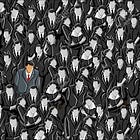The media—conservative alternative media especially—tells us time and again that China is our adversary. We must stand against China in all things, for China wishes us nothing but harm.
For this reason, the House of Representatives last Wednesday passed—on a surprisingly bipartisan basis—HR 7521: Protecting Americans from Foreign Adversary Controlled Applications Act. Behind that rubric of “foreign adversary controlled applications” lies a single application: the social media platform TikTok.
The House voted Wednesday to pass legislation that could ban TikTok in the U.S. as Republicans and Democrats alike sound the alarm that the popular video-sharing app, owned by a China-based company, is a national security threat.
The vote was 352-65, with one member, Rep. Jasmine Crockett, D-Texas, voting present. The bill now heads to the Senate, where it faces an uncertain fate and there appears to be less urgency to act.
Speaker of the House Mike Johnson (R-La) celebrated the bill’s passage by decrying China as America’s geopolitical foe:
"Communist China is America’s largest geopolitical foe and is using technology to actively undermine America’s economy and security," Speaker Mike Johnson, R-La., said in a statement after the vote, warning that TikTok could be used to access American data and spread "harmful" information.
"Today’s bipartisan vote demonstrates Congress’ opposition to Communist China’s attempts to spy on and manipulate Americans, and signals our resolve to deter our enemies."
Yet while there was bipartisan support for the bill, there was also some bipartisan opposition to it, with 15 Republicans and 50 Democrats voting against the legislation, including Jim Hines of Connecticut, the ranking Democrat on the House Intelligence Committee.
The top Democrat on the Intelligence Committee, Rep. Jim Himes of Connecticut, was a surprising no vote. He also cited free speech issues with the bill.
Adversaries like China "shut down newspapers, broadcast stations, and social media platforms. We do not," Himes said in a statement. "We trust our citizens to be worthy of their democracy. We do not trust our government to decide what information they may or may not see."
Yet there is a question to be asked here: what does it mean when Speaker Johnson says “China is America’s largest geopolitical foe”? Are we at war with China? Is China at war with the United States?
How is it that TikTok is uniquely dangerous among social media apps and platforms?
This is no idle question. The social media giants have been central to most, if not all, of the controversies surrounding “fake news” and “misinformation”, first during the Trump Administration and then as part of the Pandemic Panic Narrative.
We must not forget that social media app Facebook took it upon itself to censor coronavirus “misinformation” during the early days of the SARS-CoV-2 outbreak in 2020.
Facebook merely deleted any posts it did not like.
Twitter, for its part, suspended the Twitter account for ZeroHedge, an alternative media publication that was reporting several things contrary to the Pandemic Panic Narrative.
On January 31, Twitter permanently banned alternative media site and news aggregator ZeroHedge. The presumed reason for the ban stems from an article appearing on Buzzfeed claiming that ZeroHedge was responsible for "doxing"--revealing the personal identity of someone--a Chinese scientist potentially involved with weaponizing the Wuhan Coronavirus.
A popular pro-Trump website has released the personal information of a scientist from Wuhan, China, falsely accusing them of creating the coronavirus as a bioweapon, in a plot it said is the real-life version of the video game Resident Evil.
First and foremost, we must address a key defect of the Buzzfeed article: it is false from start to finish. ZeroHedge did not "falsely accuse" anyone, and the scientist discussed in the relevant ZeroHedge article is someone whose name, information, and academic credentials are public knowledge--meaning it is impossible for him to be doxed.
No less disturbing is the treatment Google gave to James O’Keefe after releasing a video showing Google employees casually discussing what arguably could be called election interference.
No less disturbing is what appears to be the prevailing attitude at Google regarding the people and politics they dislike. Among the other nuggets uncovered by Project Veritas are documents where noted conservative commentators such as Ben Shapiro and Jordan Peterson are referred to as "Nazis" (Note: Ben Shapiro is Jewish, which makes such characterization particularly obnoxious).
Also troubling is Google's response to the story. When James O' Keefe uploaded the video presentation where they broke this story to YouTube (owned by Google), Google deleted it. Faced with criticism of their policies and censorious business practices, Google doubled down on censorship and attempted to silence Project Veritas:
Twitter (pre-Elon Musk), Facebook, YouTube. All these social media platforms have worked to censor and to silence—and still are.
Even LinkedIn silenced me and deplatformed me for nearly two years for the unpardonable sin of contesting the official narratives on COVID and COVID mortality.
All of these platforms colluded to deplatform a number of controversial figures in 2019, from the execrable and hateful Louis Farrakhan to Alex Jones, in a blatant denial of basic civil liberties and human rights.
I wrote in defense of Louis Farrakhan then, not because I respect what he has to say, but because I despise what he has to say. It is easy to defend those with whom we agree, but the imperative of Free Speech demands that we defend those with whom we disagree most strongly.
We are told that TikTok is a “security threat” because it is “Chinese”.
How are Facebook, Twitter, Google/YouTube, and even LinkedIn not a threat to my civil liberties and my inalienable rights? How are they not constantly policing what people may say—and therefore what they may think? If TikTok is dangerous because it is “Chinese”, how much more dangerous is Facebook because it is “American”?
When we read the text of HR 7521, there is little comfort to be found in the legislation, as it contains loopholes that arguably would extend the authority to ban social media platforms beyond TikTok to any platform deemed “dangerous” by the President unilaterally.
(2) COVERED COMPANY.—
(A) IN GENERAL.—The term “covered company” means an entity that operates, directly or indirectly (including through a parent company, subsidiary, or affiliate), a website, desktop application, mobile application, or augmented or immersive technology application that—
(i) permits a user to create an account or profile to generate, share, and view text, images, videos, real-time communications, or similar content;
(ii) has more than 1,000,000 monthly active users with respect to at least 2 of the 3 months preceding the date on which a relevant determination of the President is made pursuant to paragraph (3)(B);
(iii) enables 1 or more users to generate or distribute content that can be viewed by other users of the website, desktop application, mobile application, or augmented or immersive technology application; and
(iv) enables 1 or more users to view content generated by other users of the website, desktop application, mobile application, or augmented or immersive technology application.
While in theory the legislation is targeted solely at technology platforms from China, Russia, North Korea, and Iran1, there is no prevention to that list of “foreign adversaries countries” being altered or expanded at will—or even being amended to make it solely at the discretion again of the President of the United States.
HR 7521 arrogates a tremendous authority over online speech to the Federal government, places it in the hands of one man, the President of the United States, and provides little check on the use of that authority.
Indeed, the bill goes so far as to both limit which federal courts may hear challenges to the bill, and to limit the time frame for which such challenges may be heard.
SEC. 3. Judicial review.
(a) Right of action.—A petition for review challenging this Act or any action, finding, or determination under this Act may be filed only in the United States Court of Appeals for the District of Columbia Circuit.
(b) Exclusive jurisdiction.—The United States Court of Appeals for the District of Columbia Circuit shall have exclusive jurisdiction over any challenge to this Act or any action, finding, or determination under this Act.
(c) Statute of limitations.—A challenge may only be brought—
(1) in the case of a challenge to this Act, not later than 165 days after the date of the enactment of this Act; and
(2) in the case of a challenge to any action, finding, or determination under this Act, not later than 90 days after the date of such action, finding, or determination.
Yes, the Congress has declared that this legislation can be challenged only for six months after it is enacted, and then only in one particular federal circuit court—the District of Columbia Circuit.
This last section on judicial review is particularly obnoxious, for while the First Amendment is widely known to be the guarantor of the right of Free Speech within the United States, it also is the guarantor of every person’s right to seek redress for wrongs done.
Congress shall make no law respecting an establishment of religion, or prohibiting the free exercise thereof; or abridging the freedom of speech, or of the press; or the right of the people peaceably to assemble, and to petition the Government for a redress of grievances.
This legislation is explicitly abridging the right of the people to petition the Government for a redress of grievance with respect to any “foreign adversary controlled application” (TikTok and whichever other apps the ruling regime decides it does not like).
That this legislation is by its very nature abridging the freedom of speech for everyone by deciding for all Americans which social media platforms they are allowed to use is equally offensive and repugnant not only to the Constitution, but to every basic conceptualization of personal freedom and personal liberty.
I shall be clear: China is ruled by a fascist oligarchy and currently controlled by one man who is quite possibly the most megalomaniacal ruler of a major country since his idol Mao Zedong. China’s disdain for even the most basic of human rights and for all human liberties is well documented for the world to see. There is no need to describe the endless ways China seeks to trample on and abuse the rights of its citizens—surely by now this is all common knowledge.
We need only recall the Dantesque scenes of a locked down Shanghai during the height of Xi Jinping’s “Zero COVID” lunacy to know the degeneracy of the Chinese Communist Party which rules over China today.
We need only watch the slow—but likely accelerating—implosion of the Chinese economy due to CCP mismanagement to see how casual and careless Beijing can be in trampling over the lives of the Chinese people.
It is no great stretch to make the case that China under the malignant rule of the Chinese Communist Party is a government in every way antithetical to the ideals laid out in the United States Constitution.
Yet as evil as the CCP might be, and as corrupt and degenerate as government by the CCP may be, we must be mindful of one key fact here: TikTok has not been accused of any crime, and certainly has not been charged with any crime. The only thing TikTok has done “wrong” at this point is to be owned by a Chinese company.
Readers may recall that I have discussed the evolution of legal theories of corporate personhood in this Substack previously, and those legal theories bear particular relevance here.
Regardless of how we apprehend the legal status of companies large and small, one thing is indisputable—in this country companies can be charged with crimes, tried in a court of law, and potentially convicted and punished in full accordance with the law.
Yet to assert the power to charge corporations with crimes is also the assertion of their possessing the same fundamental liberties as natural corporeal persons.
One such liberty is found explicitly detailed in both Article 1 Section 9 of the Constitution as well as Article 1 Section 10—an absolute prohibition on bills of attainder.
No Bill of Attainder or ex post facto Law shall be passed.
It is not lawful under the Constitution for any government at any level—local, state, or federal—to pass a law unilaterally declaring anyone to be an outlaw, a criminal, or to otherwise disadvantage and disabuse them of their fundamental civil liberties.
Yet HR 7521 is exactly such a bill. It is the very definition of a bill of attainder, and is the exact sort of legislation the Constitution expressly and categorically forbids, without exception.
We are told this is for our “security”—what manner of security is it that takes away our freedom, desecrates our civil liberties, and despises our inalienable rights, merely because a corporate entity is “Chinese”?
I will not debate the degree to which China has malevolent or benevolent feelings towards the United States. If we look at Sino-American relations through a Great Power Competition lens, we can easily see that China is very much in competition with the United States for spheres of influence
What I will debate is the propriety of violating our most basic law—the United States Constitution—in pursuit of some ill-defined “security” concern.
What I will debate is the wisdom of declaring TikTok to be dangerous because it is Chinese while ignoring the numerous ways in which other social media platforms have been far more demonstrably damaging to our civil liberties, to Free Speech, and to the fabric of a Free Society which we should all hold most dear.
China is of course a geopolitical competitor to the United States. So is the European Union, so is India, and so is Russia. All these powers and the United States are eternally in pursuit of greater geopolitical influence and power. This is the essence of Great Power Competition and has been from the dawn of civilization.
Yet our civil liberties do not exist to further the United States as a global or even a regional hegemon. Our inalienable rights are not a vehicle for making the United States the preeminent power in the world. Our freedoms are meant for us as individuals, that we may be free and not be beholden to any government of man.
It takes no great Constitutional scholar to see that, in the current state of affairs, this aspect of the Constitution is honored far more in the breach than in the observance, but that is precisely the point. Too often and for too long civil liberties have given way to other exigencies. That the Constitution is routinely ignored by those whom we elect to power is not a defect of the Constitution, but rather a defect of our own industry in pursuit of our own citizenship. As we elect people to Congress, we have the power to elect other people to Congress.
We will not make this nation one bit more safe by abridging our civil liberties yet again over some ambiguous threat from “China”. We will not preserve our freedoms or our liberty by suppressing them in order to more aggressively confront China.
Government should not have—does not have—the authority to decide which social media applications people may use. Neither that power nor any remotely similar to it may be found within the text of the Constitution. What the Constitution does not allow the Congress should not attempt to legislate.
The Constitution does not allow the Congress to ban TikTok nor any other social media application. Congress should not attempt to do so.
HR 7521 was passed by the House of Representatives. God willing it will die in the Senate. That it most assuredly needs to do.











I agree completely, absolutely, and in total.
The things being done to Americans for their security is resulting in having neither security or things, much less protection.
I think one time Ben Franklin said something similar.
Elon Musk and X (Twitter) will be next, then Rumble, Substack, Truth Social and so on